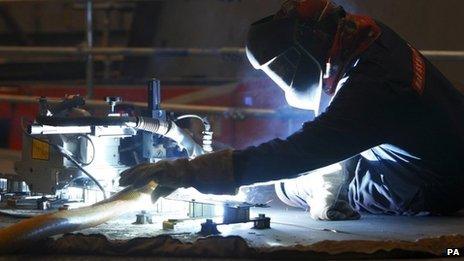Row over UK warships work on Clyde post-referendum
- Published

Work on the new Type 26 vessels has been earmarked for BAE systems shipyards at Govan and Scotstoun
Former Defence Secretary Lord Reid has warned UK warships will not be built in Scotland if there is a "Yes" vote in next year's independence referendum.
It comes after BAE Systems announced plans earlier this week to cut 1,775 jobs at its UK yards.
Lord Reid said the Type 26 vessels earmarked for the Glasgow yards would not be built in "a foreign country".
Deputy First Minister Nicola Sturgeon has insisted the Clyde is the only place where the ships can be built.
On Wednesday BAE confirmed job losses at its sites across the UK.
Shipbuilding will end at Portsmouth in the second half of next year and hundreds of jobs will be lost in Scotland at the Govan and Scotstoun yards in Glasgow, as well as at Rosyth in Fife.
The firm also announced work on the new Type 26 vessels was earmarked for the Glasgow yards, giving workers there a vital lifeline.
Writing in the Scottish Sunday Express newspaper, Lord Reid said: "The wider lesson from the last few days is that the only way to secure the future of Scotland's shipyards is to remain in the UK.
"This is not a matter of political opinion, it is a matter of fact.
"It is a fact that since the Second World War no UK government of any political stripe has ever commissioned the building of a warship in a foreign country.
"It is a fact that for security, as well as economic and political, reasons we build these ships here at home in the UK."
He added: "In short, we don't build warships abroad now - and what's left of the UK wouldn't do so if Scotland separated."
The Scottish government has dismissed suggestions that a "Yes" vote would put future shipyard orders in doubt and has said joint procurement of Type 26 vessels could be possible.
Writing in the Sunday Herald, Nicola Sturgeon, said: "The current UK government has just agreed with BAE Systems that Portsmouth will cease building ships in 2014, and that Glasgow is 'the most effective location for the manufacture of the future Type 26 ships'. That will remain true, whether there is a 'Yes' next year or not."
Scottish Secretary Alistair Carmichael has called on the deputy first minister to "admit she is wrong" on the assertion that an independent Scotland could still build UK warships.
He said: "Nicola Sturgeon is looking pretty isolated on this.
"Is she really saying that everyone else is wrong and she is right? Is she telling us that the people who build the warships and the people who place the contracts know less about this than she does?"
He added: "The future of the Clyde yards is sustainable as part of a large and successful United Kingdom. Brilliant workers and the best complex warships in the world, it is a great combination and we should not break it."
Ms Sturgeon rebuffed suggestions that Scottish yards would not get the work if the country became independent.
She said: "Our support for the Clyde is unconditional, whatever the people decide next year - as the shop steward of the Govan yard has demanded it should be - but the support of Mr Carmichael and his colleagues seems conditional on Scots doing what Westminster wants.
"The Scottish Secretary needs to tell people - does he support this work staying on the Clyde whatever the result of next year's referendum or is he actively engaged in undermining the future of one of our great industries?"
Defence budget
The UK's chief of defence staff, General Sir Nicholas Houghton, stepped into the debate when he was asked by the BBC's Andrew Marr if the newly announced Clyde contract would have to be revisited in the event of Scottish independence.
He believed there might have to be "some reconsideration".
But the general added: "I think that we live in a world now where it is not the purpose of the defence budget to underwrite elements of industry. We will go and get our ships in the place where it makes the most sense for the British taxpayer in terms of getting the right capability for the armed forces."
Sir Nicholas also told the Marr Show: "I certainly don't hold to the view that the decision on the future of British ship building was one born of a political mandate.
"It was very much a matter of a business rationalisation. In terms of raw business sense it makes sense that the place that they have the greatest capacity and the best depth of skills, which is on the Clyde, that is driven by a business decision."
- Published9 November 2013
- Published8 November 2013
- Published7 November 2013
- Published7 November 2013
- Published7 November 2013
- Published6 November 2013
- Published6 November 2013
- Published6 November 2013
- Published6 November 2013
- Published6 November 2013
- Published6 November 2013
- Published6 November 2013